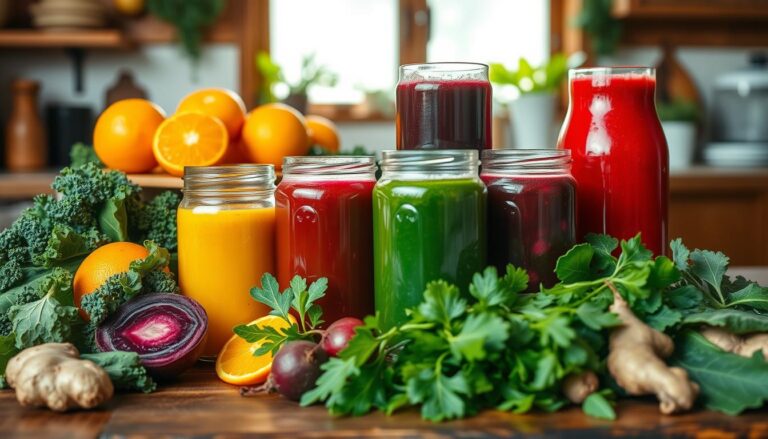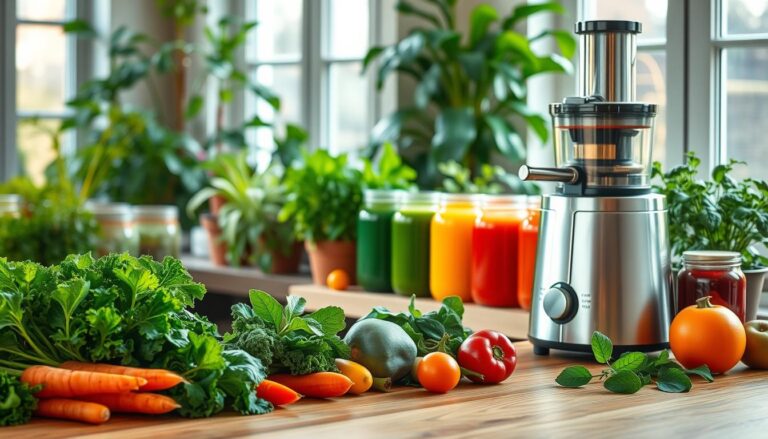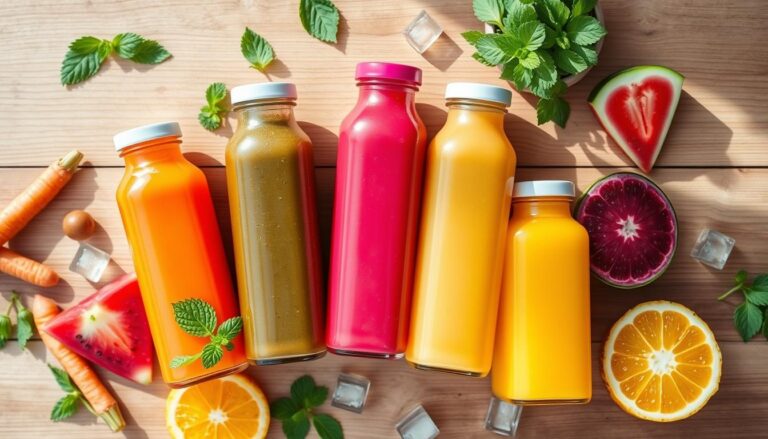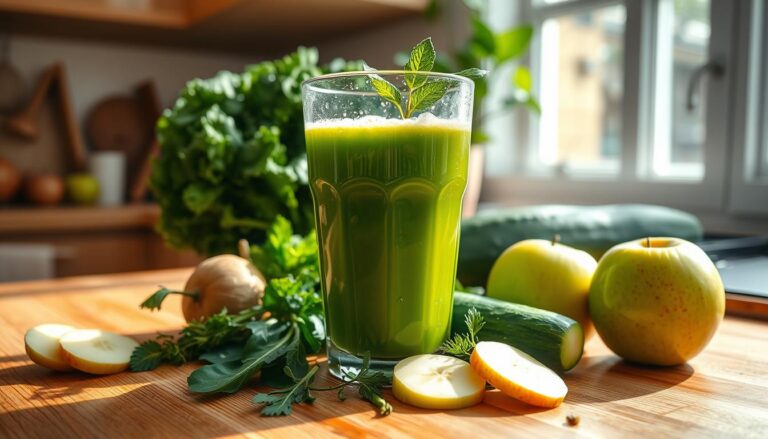Tasty Juicing Recipes to Boost Digestion
Imagine you’ve tried everything to feel better after eating, but your stomach still hurts. Nine out of ten people face gut problems. Juicing offers a vibrant, nutrient-rich way to help your digestion without the hassle. These juicing recipes for digestion mix science and taste to boost your health.
Today, healthy juice recipes are more than just trends. They’re tools to help your digestion. Each sip is filled with vitamins and fiber to ease your gut. This guide offers recipes that are backed by science and easy to follow.
Table of Contents
Understanding How Juicing Benefits Your Digestive System
Today’s diets often miss out on fiber and key nutrients for a healthy gut. Juicing pulls out vitamins and minerals from fruits and veggies, making them easier to digest. But how do these digestive health juices really help? Let’s explore.
The Science Behind Juice and Gut Health
Juicing takes out pulp but keeps in phytonutrients like antioxidants. These help reduce inflammation in the gut. Research shows natural remedies for digestion like carrot or beet juice can help grow good bacteria in the gut. Yet, juices don’t have enough fiber to replace solid foods.
Key Nutrients in Juices That Support Digestion
- Vitamin C in citrus juices boosts collagen for intestinal wall integrity.
- Enzymes in pineapple (bromelain) and papaya (papain) aid protein digestion.
- Potentiate bile flow with chlorophyll from green juices like kale or wheatgrass.
How Frequently You Should Consume Digestive Juices
Experts say drink 8–16 ounces daily as a supplement, not a meal. Too much can cause sugar spikes: apple juice has 25g sugar per 8 oz. Mix juices with fiber like chia seeds or oats to slow down sugar release. Always eat whole foods first, using juices to fill in nutrient gaps.
Essential Equipment for Creating Digestive-Friendly Juices
Making homemade digestive juices begins with the right tools. Whether you’re new or experienced, the right gear keeps your juices full of nutrients. A top-notch juicer pulls out vitamins without losing enzymes, which help with digestion. The Ultrean Juicer is great for easy juicing recipes like cucumber-ginger or apple-beet mixes.
- Centrifugal Juicers: They’re cheap and quick, but might lose some nutrients. Good for fast easy juicing recipes.
- Masticating Juicers: They work slowly and keep enzymes alive. Best for leafy greens in soothing drinks.
- High-Speed Blenders: Blend whole fruits and veggies into thick drinks. Perfect for homemade digestive juices like spinach-pineapple smoothies.
- Manual Juicers: They’re quiet and manual, great for small batches of citrus juices.
Storage is key too. Use glass jars with tight lids to keep juices fresh. Clean your gear right after to avoid buildup. Even without a juicer, a blender or food processor can make simple recipes like watermelon-lime mixes. Start with what you have and upgrade as you get better at juicing.
Top Ingredients That Promote Healthy Digestion
When making the best juices for gut health, picking the right ingredients is crucial. Drinks that are good for your gut need fiber, anti-inflammatory compounds, and natural enzymes. Let’s look at the top ingredients to boost your digestive health.
Fiber-Rich Fruits and Vegetables
Go for organic fruits and veggies to avoid pesticides. These can harm your gut microbiome. Here are some high-fiber choices:
- Apples: Pectin fiber feeds good gut bacteria.
- Beets: Nitrates help blood flow to your digestive system.
- Carrots: Soluble fiber helps grow healthy gut bacteria.
- Cranberries: Tannins stop harmful bacteria from sticking to your gut walls.
Anti-Inflammatory Roots and Herbs
Use these ingredients to fight inflammation:
- Ginger: Gingerols calm upset stomachs and reduce irritation.
- Turmeric: Curcumin’s antioxidants fight gut inflammation.
- Tart Cherries: Anthocyanins neutralize free radicals in the digestive tract.
- Aloe Vera: Soothes inflammation and repairs gut lining damage.
- Blueberries: Anthocyanins protect against gut lining damage.
Digestive Enzymes in Fresh Produce
These ingredients naturally help with digestion:
- Pineapple: Bromelian breaks down proteins for easier digestion.
- Papaya: Papain enzymes break down complex carbs and proteins.
- Lemon/Lime: Vitamin C boosts stomach acid production naturally.
Mixing these ingredients makes gut-friendly drinks that nourish your body. Choose organic options for the best results and to avoid irritants.
Juicing Recipes for Digestion: 5 Powerful Combinations to Try Today
Make your juicing routine better with these blends that tackle digestive problems. Each healthy juice recipe has ingredients known for healing the gut. Ready to try a juice that helps with bloating, boosts fiber, or soothes irritation? Here are five easy recipes to try.
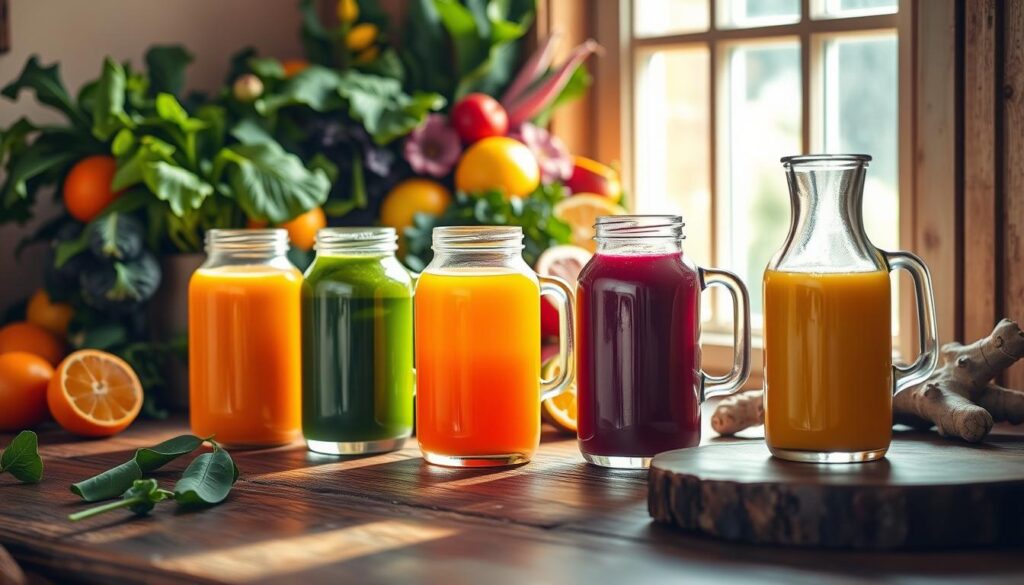
Morning Digestive Kickstart Juice
Start your day with this energizing blend:
- 1-inch fresh ginger root
- 1 peeled lemon
- 1 medium apple
- 1 cup packed spinach
Blend all in a high-speed juicer. Ginger’s gingerols kickstart digestive enzymes. Lemon vitamin C boosts stomach acid. Apple pectin feeds probiotics, and spinach has magnesium for muscle ease. Add 1 tbsp honey for sweetness.
Post-Meal Bloating Relief Blend
After big meals, this mix helps with gas and discomfort:
- 1 cup chopped cucumber
- 1/2 cup pineapple chunks
- 1/4 cup fresh mint leaves
- 1/2 inch fresh turmeric
Strain through a juicer. Pineapple’s bromelain breaks down proteins. Turmeric curcumin fights inflammation. Cucumber’s water flushes toxins. Add 1 tsp honey for taste.
Gut-Soothing Green Juice
Cool irritation with this alkalizing blend:
- 2 cups kale
- 1/2 cucumber
- 1/2 green apple
- 1/2 cup parsley
Process until smooth. Kale fiber binds toxins. Parsley’s chlorophyll neutralizes acids. Studies show it may reduce oxidative stress, like carrot juice research in 2012. Add lemon juice for extra vitamin C.
Constipation-Busting Berry Mix
Combine these fiber-rich ingredients:
- 1/2 cup prunes
- 1/2 cup blueberries
- 1/2 apple
- 1 cup watermelon
Blend until smooth. Prunes’ sorbitol draws water into the gut. Blueberry anthocyanins reduce inflammation. Watermelon’s 90% water aids hydration. Adjust sweetness with 1/2 banana.
Inflammation-Reducing Root Juice
Curb inflammation with this earthy blend:
- 2 medium carrots
- 1 inch turmeric
- 1/2 beet
- 1/2 apple
Use a slow juicer for best results. Beet nitrates improve gut blood flow. Turmeric curcumin fights inflammation. Pair with black pepper to boost absorption. Add lime juice for vitamin C.
These juicing recipes for digestion use ingredients proven to tackle gut issues. Adjust ingredients to taste, but keep core components intact. Store in glass bottles for freshness and sustainability.
How to Prepare Your Ingredients for Maximum Digestive Benefits
Proper preparation is key to keeping your juicing recipes for digestion full of nutrients. Begin by washing fruits and veggies well with water to get rid of pesticides. Some peels, like those on apples or carrots, are full of fiber and nutrients. So, leave them on for easy juicing recipes that offer great gut benefits.
- Soak nuts and seeds overnight to break down enzyme inhibitors, making nutrients easier to digest.
- Sprout seeds like chia or flax to boost their antioxidant content before juicing.
- Pair ingredients—combine leafy greens with a dash of olive oil to enhance nutrient absorption.
Cold-press juicing keeps more enzymes than traditional methods. Keep cut produce in airtight containers for up to 24 hours to keep vitamins fresh. Always chop ginger and turmeric finely to release anti-inflammatory compounds like gingerols and curcumin. Avoid over-processing leafy greens, which can release bitter compounds if blended too long.
Proper prep boosts the bioavailability of nutrients like pectin in apples and anthocyanins in berries, aiding gut bacteria growth.
For easy juicing recipes, mix pineapple with spinach and aloe vera for a soothing blend. Always adjust portions based on your dietary needs—like reducing citrus if sensitive to acidity. Small steps in preparation make a big difference in how your body absorbs nutrients and reduces digestive strain.
Best Times to Drink Your Digestive Juices
Drinking digestive health juices at the right time can boost their benefits. Match your juice drinking with your body’s natural rhythms. This helps with better nutrient absorption and gut comfort.
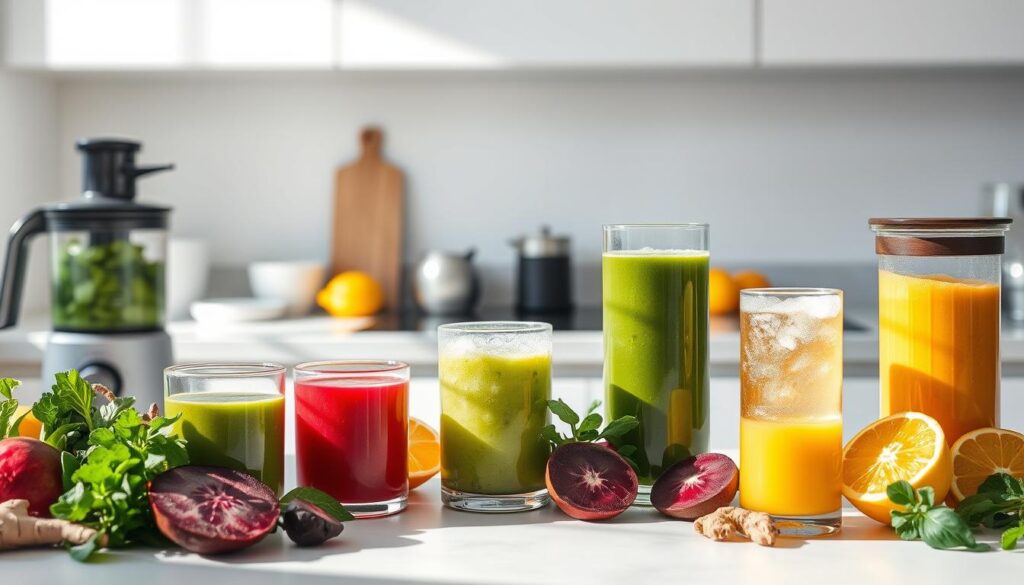
Morning Routine Benefits
Start with a 150ml glass of gut-friendly drinks as soon as you wake up. An empty stomach is best for absorbing nutrients like turmeric’s curcumin. Try the Turmeric and Apple Digestive Tonic (rated 4.9/5) to kickstart digestion. Mix 80% veggies with 20% fruit for the right balance of sweetness and fiber.
Strategic Consumption Around Meals
Here are some tips for the best times to drink your juices:
| When | Optimal Choice | Why It Works |
|---|---|---|
| 15–30 mins before meals | Pineapple-Ginge | Bromelain enzymes aid protein digestion |
| Between meals | Spinach-Celery | Prebiotics nurture gut bacteria |
| 2 hours post-meal | Beet-Apple | Antioxidants reduce post-meal bloating |
Evening Digestive Reset Options
End your day with gentle juices like aloe vera or chamomile. Research shows probiotics like Bifidobacterium longum improve gut-brain health. Pair them with calming herbs. Avoid sugary drinks at night to prevent blood sugar spikes. Choose hydrating drinks like celery or cucumber to keep your intestines moist overnight.
Common Juicing Mistakes That Can Harm Digestion
Using homemade digestive juices can be helpful for digestion. But, some habits can actually harm you. Here are three big mistakes to avoid:
Sugar Content Concerns
- Too much sugar from fruits like apples or pineapples can raise blood sugar. This can make bloating or insulin spikes worse.
- Keep a 70% veggie-to 30% fruit ratio. This balances sweetness and nutrients.
Improper Storage Methods
- Letting juice sit out for more than two hours can let bacteria grow. This can upset your digestion.
- Store juice in airtight glass containers for 24-36 hours. This keeps enzymes active.
Ingredient Combinations to Avoid
- Mixing citrus with leafy greens can make your stomach lining sore. It’s too acidic.
- Don’t blend root vegetables with tropical fruits. It’s too hard on digestive enzymes.
Always use fresh, pesticide-free ingredients. Drinking small amounts of juice while chewing can help. This way, your homemade juices can really help your gut health.
Creating a 3-Day Juice Plan for Digestive Reset
Start your digestive health journey with a 3-day juice cleanse. This plan includes the best juices for gut health. It helps detox, reduce inflammation, and rebuild good gut bacteria. Prepare your ingredients the night before to make mornings easier.
- Day 1 (Gentle Cleanse): Begin with celery, cucumber, and green apple juice to remove toxins. Add a broccoli-kale-spinach mix with ginger in the afternoon for anti-inflammatory benefits.
- Day 2 (Anti-Inflammation Focus): Drink carrot-beet-blueberry juice in the morning for antioxidants. In the afternoon, enjoy pineapple-orange-mango blends for natural enzymes.
- Day 3 (Gut Flora Rebuilding): Start with avocado-carrot juice to support nutrient absorption. Finish the day with a spinach-pineapple-orange mix for vitamins and fiber.
Stay hydrated with lemon water or herbal tea between juices. Avoid solid foods but drink herbal teas like peppermint or ginger to ease digestion. After the cleanse, slowly add foods back into your diet, watching for reactions to dairy or gluten. A 2023 study shows short-term diet changes can affect gut bacteria, but long-term, eating fiber-rich foods is crucial.
Caution: Pregnant individuals, those with diabetes, or kidney/liver issues should consult a healthcare provider before starting. Discontinue if you experience dizziness or nausea.
Combine this plan with light exercise like yoga to boost detox. Remember, a juice cleanse is a temporary reset, not a meal replacement. Keep track of your energy and digestion to see how well it works. By choosing the best juices for gut health, you lay a strong foundation for lasting digestive health.
How to Incorporate Digestive Juices into Your Overall Wellness Routine
Nearly 42% of Americans struggle with digestive issues like bloating or constipation. Adding gut-friendly drinks like juices to your routine can help. Follow these steps for lasting benefits.
Pairing with Digestive-Friendly Foods
- Drink juices with fermented foods like kimchi or yogurt for more probiotics.
- Try beet juice with oats or quinoa for better digestion.
- Balance juice sugars with lean proteins like grilled chicken.
Complementary Lifestyle Practices
- Reduce stress with 10-minute breathing exercises to ease gut tension.
- Drink water between meals to enhance juices like cucumber or tomato.
- Walking 30 minutes a day boosts gut health and juice absorption.
Tracking Your Digestive Improvements
Keep a symptom journal to track changes like less bloating or regular bowel movements. Monitor for 2-4 weeks. Look for patterns after drinking certain juices or eating specific foods.
Mixing gut-friendly drinks with mindful habits boosts their effect. Small changes like eating fermented foods or staying hydrated can make a big difference. Adjust your routine based on how your body reacts for lasting wellness.
Conclusion: Transforming Your Digestive Health Through Consistent Juicing
Using digestive health juices regularly can make a big difference. Half of adults deal with digestive issues every year. Juicing is a natural way to help.
Start with juices high in fiber like apples and carrots. They have pectin and beta-carotene to help with regular bowel movements. Pineapple and papaya juices have enzymes that break down proteins, reducing bloating.
Ginger and turmeric juices can also help. They reduce inflammation, which is a problem for people with IBS.
It’s important to drink these juices with water and stay active. Cold-pressed juices keep more nutrients than regular ones. Start with small amounts, like 8 to 12 ounces a day.
Beetroot juice is great for digestion. It has nitrates that improve blood flow to the gut. Drinking it regularly can help with constipation.
Keep track of how you feel after starting. You might notice changes in digestion in just a few days. These juices can balance your gut bacteria and reduce inflammation over time.
Try the Gut-Soothing Green Juice from this guide. Add it to your daily routine. Slowly increase the amount and mix up the ingredients to get all the nutrients.
With regular use, you’ll see better digestion and less discomfort. Your gut microbiome will get stronger. Start with one glass and use ingredients backed by science and good habits.
FAQ
What are some effective juicing recipes for digestion?
Good juicing recipes for digestion include a Morning Digestive Kickstart with citrus and ginger. There’s also a Post-Meal Bloating Relief blend with carminative herbs. And a Gut-Soothing Green Juice with alkaline veggies. Each recipe tackles specific digestive issues and uses ingredients that work well together to improve gut health.
How can I improve my digestive health with juices?
To boost your digestive health, try juices full of fiber, anti-inflammatory ingredients, and digestive enzymes. These juices can help with bloating and constipation. They also support a healthy gut microbiome. Drinking your juices at the right time can make them even more effective.
Can juicing replace whole foods in my diet?
No, juices should not replace whole foods. While they offer easy-to-digest nutrients, whole foods are key for fiber and nutrient variety. It’s best to mix juices with whole foods for the best digestive health.
What equipment do I need for juicing at home?
For juicing at home, you can use a centrifugal juicer, masticating (cold press) juicer, or a high-speed blender. Each type has its own benefits for keeping nutrients intact. If you’re on a tight budget, consider a blender or manual juicer as alternatives.
How often should I consume digestive juices?
For the best digestive benefits, drink juices regularly. Try to do it on an empty stomach in the morning or 15-30 minutes before meals. But remember to balance juice with whole foods to avoid too much sugar, mainly from fruit juices.
What are some common mistakes to avoid when juicing?
Avoid choosing juices that are too fruity, as they can raise blood sugar. Also, don’t store juices wrong, as it can lead to nutrient loss. And be careful not to mix ingredients that might upset your stomach. Using the right veggie-to-fruit ratio and storing juices correctly can make them more beneficial.
How can I track my digestive improvements from juicing?
To track your digestive improvements, keep a symptom journal. Note any changes in digestion, symptoms, and overall health. This helps you spot patterns and adjust your juicing routine as needed. Look for changes over time to see how you’re progressing.
Are there any specific ingredients I should focus on for gut health?
Yes, focus on fiber-rich fruits and veggies, anti-inflammatory herbs like ginger and turmeric, and foods high in digestive enzymes like pineapple and papaya. Choosing organic produce can also help avoid pesticides that might upset your stomach.
What should I consider when creating a juice plan for digestive reset?
When making a juice plan, think about your prep steps before the reset, the variety of juices, and your hydration. It’s also key to listen to your body and adjust as needed during the reset.


